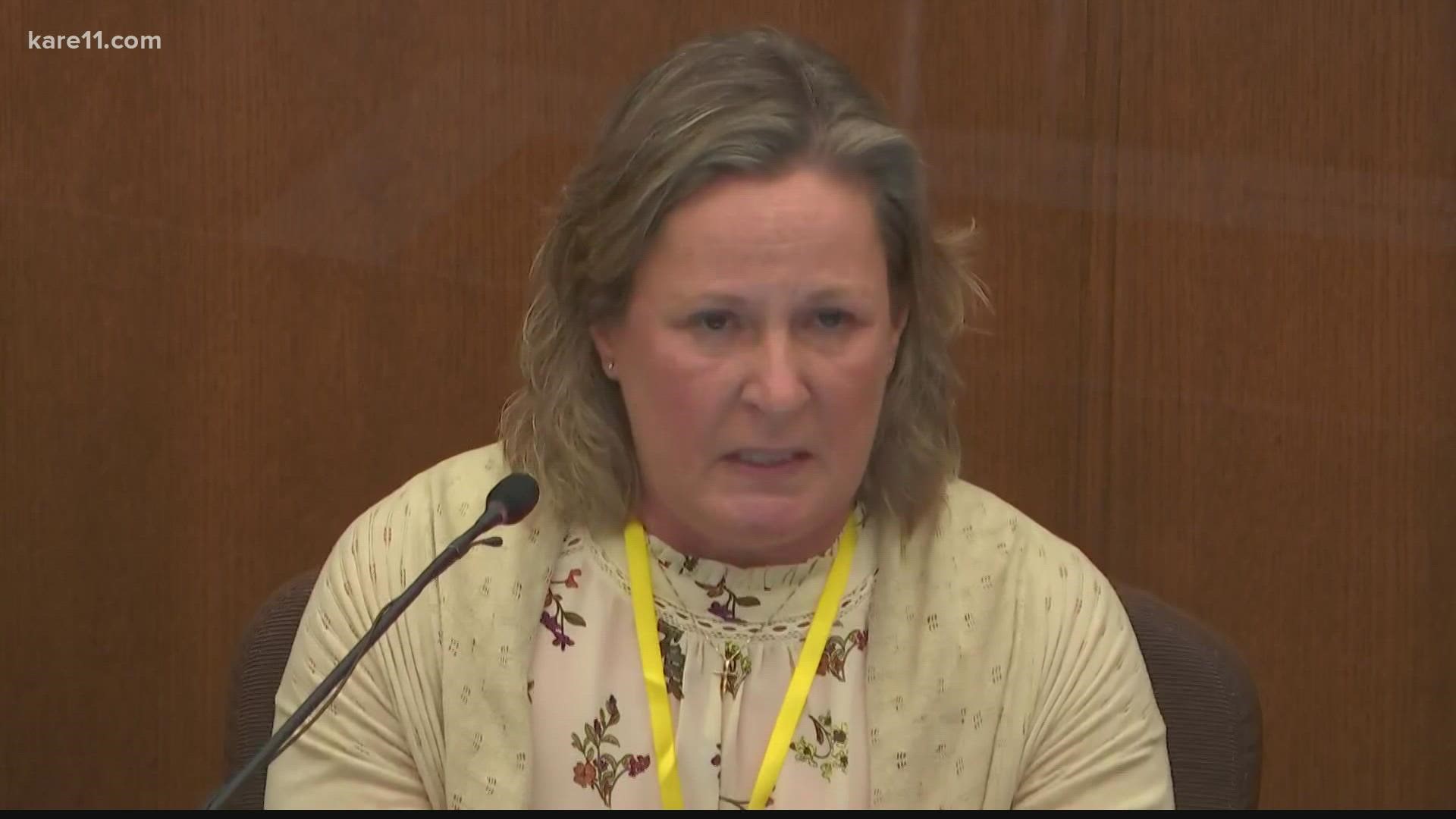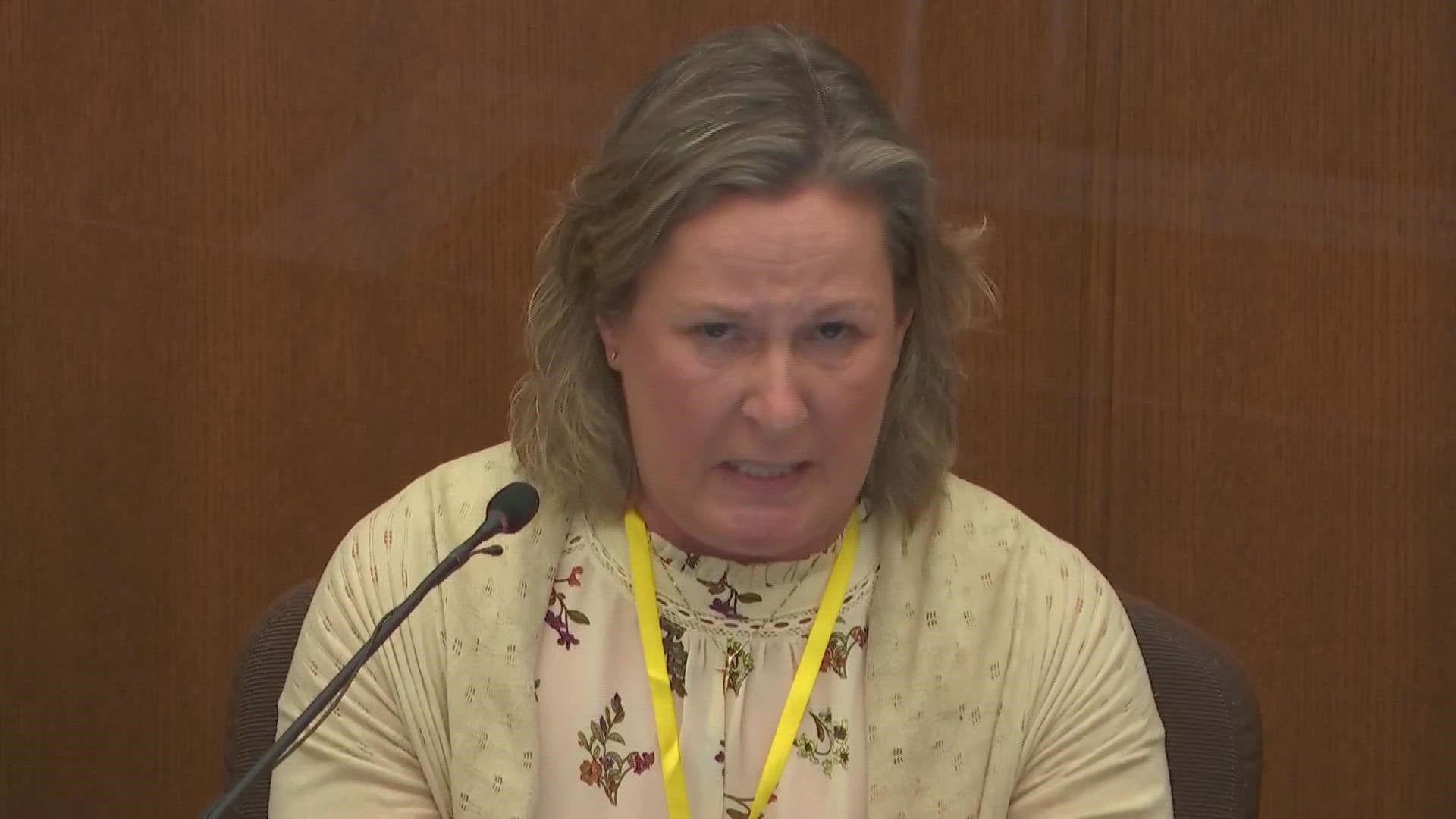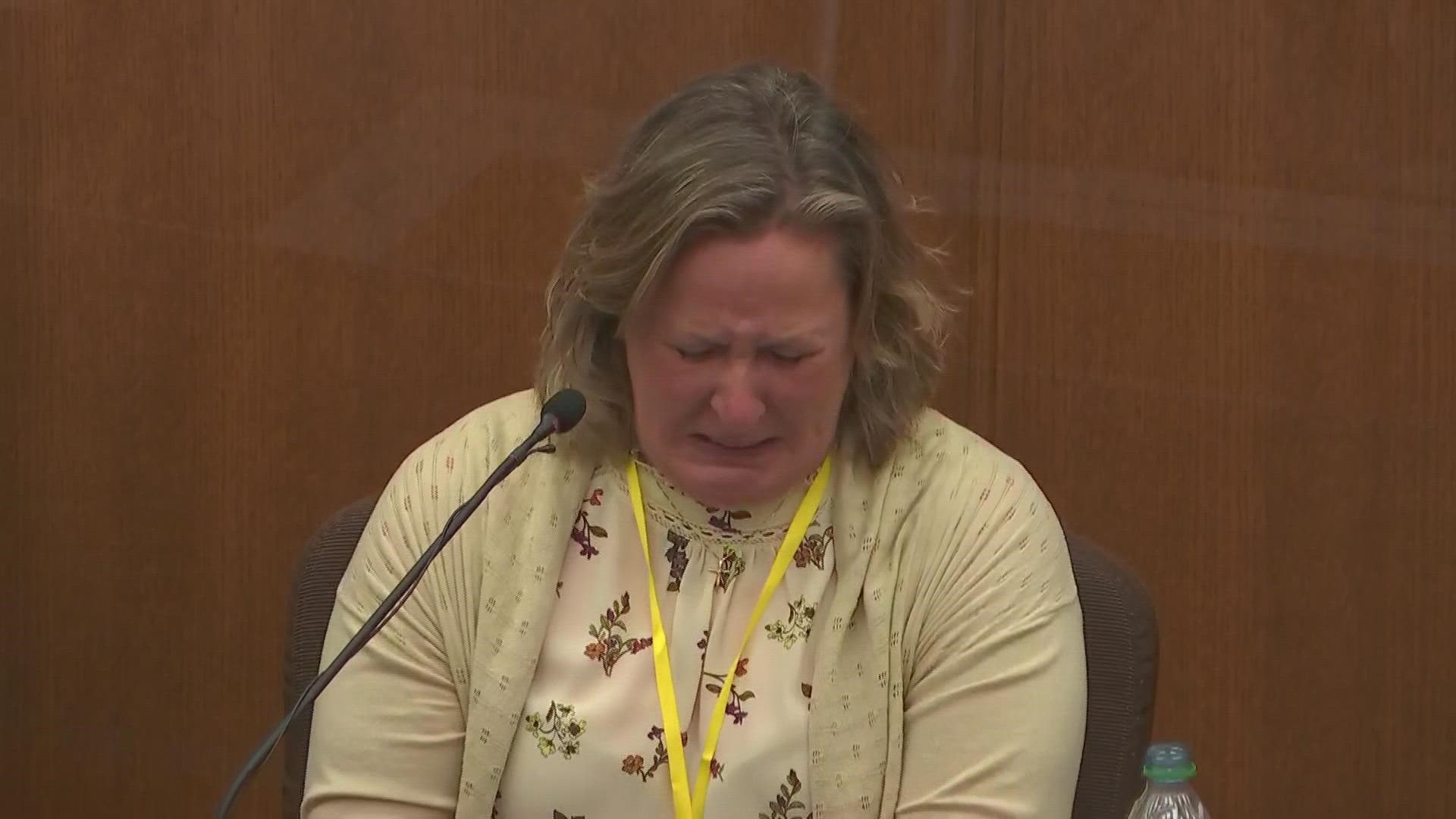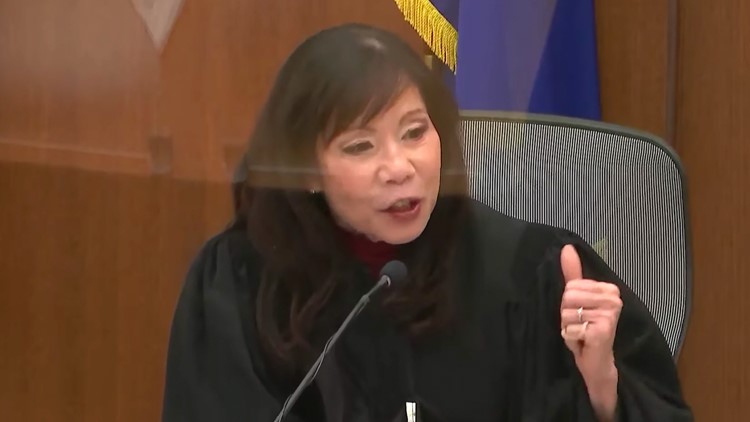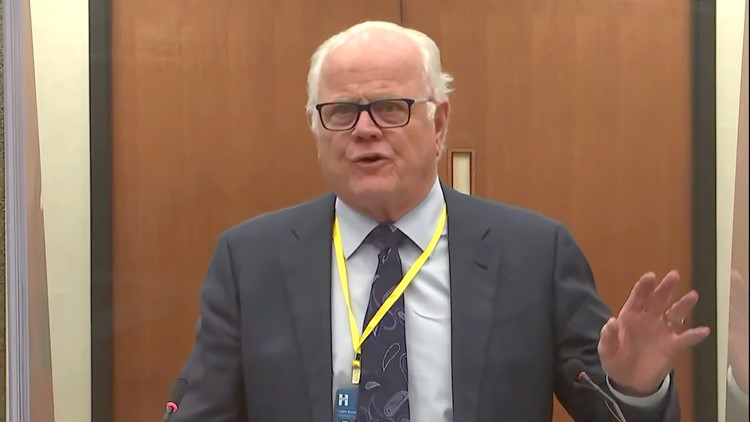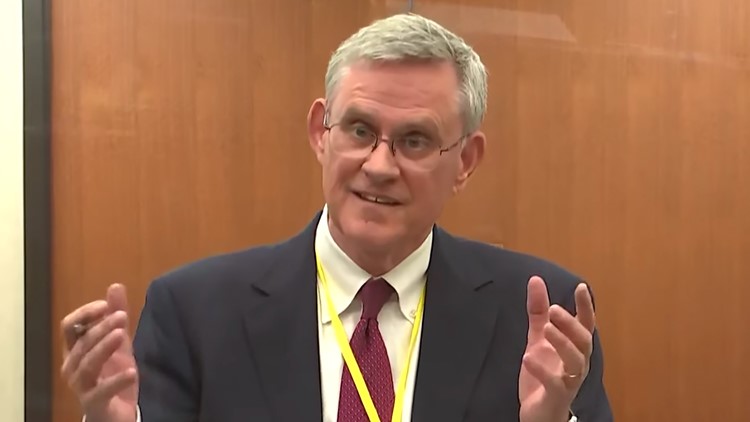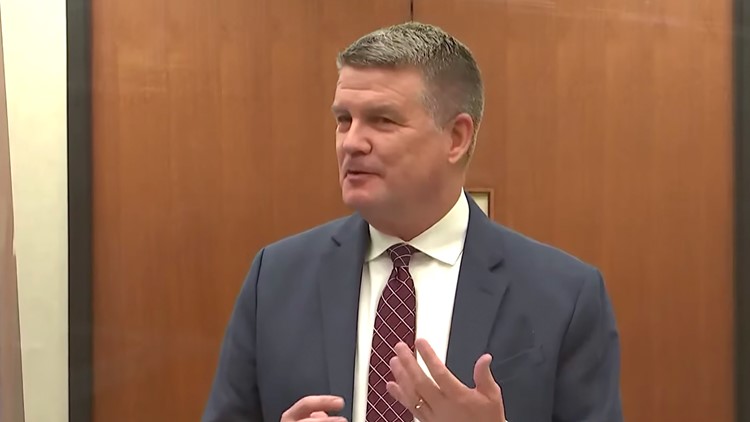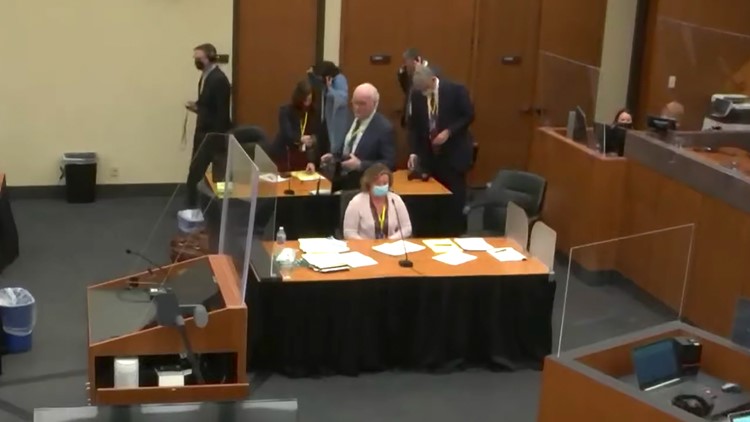MINNEAPOLIS —
- Closing arguments scheduled to begin Monday
- Defense rests its case
- Kim Potter gives emotional testimony
- Psychology expert testifies about "action errors"
- Ex-Brooklyn Center Police Chief Tim Gannon, others testify about Potter's character
Friday, Dec. 17, 2021
The defense rested its case Friday afternoon, bringing an end to witness testimony in the trial of former Brooklyn Center police officer Kim Potter.
Potter, charged with manslaughter in the April 11 shooting death of 20-year-old Daunte Wright, was the last witness called to the stand, delivering an emotional testimony in her own defense.
To begin the eighth day of testimony, the defense team started with direct questioning of Dr. Laurence Miller, a psychologist, author and professor with expertise in clinical, neuro and police psychology. The defense asked Miller to explain “action error,” which he said occurs when a person “intends to do one thing, think you’re doing it, but do something else and later realize it.” He told the court that confusing a Taser for a gun is the “most typical example” of a weapon confusion shooting.
Miller admitted to prosecutor Erin Eldridge that the more training and experience a police officer has for managing stress, the more likely it is to achieve a positive outcome. Eldridge wanted to question Miller about an interview he did with Potter after the shooting, but Judge Regina Chu sustained the defense’s objection to do so.
Court resumed following a short morning recess to listen to the highly anticipated testimony from Potter herself. Before getting into the events of April 11, defense attorney Earl Gray laid foundation to Potter as a person, asking her about her family and the early impact a visiting officer to her elementary school had made on her.
“He really influenced me as a youngster that police are good people and I wanted to be like him someday,” Potter said.
Gray went on to ask Potter about her work and training leading up to her employment as a patrol officer with the BCPD. She told Gray about her extensive education and skills training in law enforcement, going on to talk about her experience outside the department as an honor guard and crisis negotiator, among others. When asked if anyone had ever filed a complaint about Potter abusing her power as an officer in all of her years of service, she said, “no.”
Turning to the events of April 11, Potter told the courtroom she started the day as a field training officer for officer Andrew Luckey, and they had been out on patrol when they encountered Wright. She testified that Luckey was the first to initiate the traffic stop, saying had she been alone, she probably would not have done so. She said after Wright had pulled over, Luckey approached the driver’s side door and obtained Wright’s name and date of birth. Luckey then returned to the squad vehicle and entered Wright’s information into a police database. While entering Wright’s data, Potter said Luckey called in an officer for backup, later identified as Sgt. Michael Johnson.
Upon entering Wright’s data, Potter said they discovered Wright had a suspended license, bench warrant for weapons charges and a temporary protection order against him from an unknown woman. When Johnson arrived, Potter said the three officers approached Wright’s vehicle, each in different, strategical places, and said she heard Luckey ask Wright to get out of the car.
When Wright exited the car, she said Johnson told him he was under arrest and she indicated to Wright that he had a warrant. As Luckey attempted to handcuff Wright, that’s when she said, “it just went chaotic.”
Potter broke down in the courtroom as she described the ensuing “struggle” between Wright and Johnson, saying that Johnson looked fearful. She said they were trying to stop Wright from getting back in the vehicle and driving away when she remembers yelling, “Taser.”
"And then he told me I shot him," she said as she covered her face and broke into tears.
Potter told the court that she resigned a few days later because she “didn’t want bad things happening to the city,” an apparent reference to the riots in Brooklyn Center that took place in the days following Wright’s death. She also said, visibly shaking, that she sold her family home and now lives out of state.
Eldridge’s cross examination mostly focused on Potter’s training, coming to pause on Potter’s familiarity of her Taser. Eldridge showed her the BCPD’s Taser training policy, which states all trainings should include practicing drawing one’s Taser. Potter agreed with Eldridge that the purpose of that training was to reduce the risk of accidentally drawing a firearm.
Eldridge then showed Potter two images of her side-by-side, in her uniform and wearing her utility belt. Potter agreed that for 26 years, she had been wearing her firearm on her right side, and her Taser on her left side for at least the last 19 years.
As Eldridge moved to drive home her point of misconduct on behalf of Potter the day of the incident, she showed Potter’s body camera footage in the moments leading up to the shooting. Visibly wincing and shaking, Potter told her counsel she needed a break. Judge Chu then motioned to break for lunch.
An hour later, when Eldridge returned to continue her cross examination of Potter, she asked her what actions she took in the aftermath of the shooting. Potter admitted she didn’t render aid to Wright, breaking down in the courtroom and sobbing.
"I'm sorry it happened," she said. "I'm so sorry."
Potter, through tears, agreed with Eldridge that she didn't plan or want to use deadly force.
"I didn't want to hurt anybody," Potter said.
The day came to a close as Potter was allowed to step down from the stand, and Gray declared that the defense had rested its case.
Judge Chu reminded the jurors not to research the case over the weekend, and they were dismissed.
Closing arguments are scheduled to begin Monday at 9 a.m.
LIVE UPDATES:
1:51 p.m.
Gray finished his questioning by asking Potter if she had to rely on her partners in the force for assistance, to which she replied yes. He then asked, "And that would be the family of the Brooklyn Center Police Department?" Potter said yes and agreed with Gray that she considered her fellow officers to be her second family.
After Potter stepped down from the stand, Gray told Judge Chu the defense rested its case. Chu again repeated to the jurors that they are not allowed to read the news or research the case over the weekend and they were dismissed.
Closing arguments are scheduled to begin Monday at 9 a.m.
1:49 p.m.
On re-cross, Eldridge again asked Potter about her interview with Dr. Miller. She stated that it was in Miller's report that Potter told him she resigned from the police force to "protect her police family." Potter agreed that she considered some of her relationships with other officers at the department to be "important" and "close."
1:41 p.m.
Gray returned to the podium for redirect questioning, asking Potter about Eldridge's comment about unholstering her firearm as she approached Wright. He asked Potter if that would be a routine action, to which Potter replied no. She explained that as a woman standing at 5'3" tall, unholstering her weapon in that moment would present the danger of losing her gun to a suspect in a potential struggle.
He then asked Potter if she had deployed her Taser or discharged her firearm over her years and experience as a police officer, to which she said no. Gray asked what using those weapons would mean to her, to which she replied, "That I might kill somebody."
Gray then attempted to walk back the prosecution's point about Potter's expected duty to report a shooting to other responding officers. Potter told the courtroom that Sgt. Johnson, as her supervisor that day, would have been tasked with further communication about the shooting per BCPD policy.
1:30 p.m.
Court resumed after lunch with more cross examination by prosecutor Eldridge.
On a few occasions, Eldridge brought up Potter's interview with Dr. Miller. Eldridge asked if Potter remembered telling Miller she didn't know why she decided to use her Taser that day. Potter then asked to see Miller's report, ultimately agreeing with Eldridge.
She went on to ask Potter about the words she used at the scene in the aftermath of the shooting, including, "I shot him." Eldridge asked Potter if she remembered telling Miller that she saw her gun in her right hand, to which she replied, "I don't remember. I just shot someone. I had never done that before. I was in shock."
In Eldridge's next line of questioning, she asked Potter what actions she had taken after she shot Wright. Potter agreed that she had not rendered aid to Wright or communicated with other officers about what was happening at the scene. "You stopped doing your job," Eldridge said. "You were focused on what you had done because you had just killed someone."
Potter then broke down in the courtroom, sobbing.
"I'm sorry it happened," she said. "I'm so sorry."
Potter, through tears, agreed with Eldridge that she didn't plan or want to use deadly force.
"I didn't want to hurt anybody," Potter said.
11:46 a.m.
Prosecutor Erin Eldridge took the podium after almost an hour of direct questioning from the defense.
Eldridge began her cross examination of Potter by asking her about her resignation from the BCPD. Potter said she left the station a few day after the incident, prompting Eldrige to ask, "After you shot and killed Daunte Wright?" Potter said yes.
Eldridge then started to ask Potter about her education and training to become a licensed peace officer. Potter tells Eldridge she has earned a college degree, had skills and classroom training, obtained a license through the Peace Officer Standards and Training Board, and has completed all of the requirements to maintain it. She agrees with Eldridge that she has received training on use of force, firearms, Tasers, crisis negotiation and de-escalation tactics.
Potter agreed that as a police officer she was bound by policy, specifically the BCPD's, and "fundamental duty" to "safeguard life," "never employ unnecessary force," and to be "alert, attentive and capable."
Eldridge repeatedly questioned Potter about the extent of her police training, ultimately coming to pause on her familiarity with her Taser. Eldridge showed her the BCPD Taser policy, stopping on a point stating all trainings should include practicing reaction hand draws or cross draws of each officer's Taser. Potter agreed that practicing drawing a Taser is part of the effort of officers to reduce the possibility of accidentally drawing a firearm.
Potter agreed with Eldridge that she signed off on documents saying she was trained on both the risks and uses of a Taser. Eldridge questioned Potter about her duty belt, and on which side she carried her Taser. Potter agreed with Eldridge that she had carried her firearm on her right side for that last 26 years, and her Taser on her left for at least the last 19 years. Potter then agreed with Eldridge that she had not performed the Taser's required function testing on the day of Wright's shooting.
Eldridge then pivots to what happened April 11. Potter repeated her earlier testimony, saying she was officer Luckey's field training officer that day and they had decided to initiate a traffic stop after seeing Wright's expired tabs and wrong turn signal. She again stated she probably would not have stopped the vehicle had she been alone.
Potter goes on to repeat earlier testimony about the events leading up to the shooting, adding the officers at the scene had not spoken about using force before they approached Wright's vehicle. Eldridge asks if Potter remembers unholstering her firearm as she walked up to the car, to which she replies, "No, I wouldn't do that." Eldridge then shows a still photo from a squad dashcam with Potters hand in the area of her gun on her duty belt. She then agreed that it could be possible.
Eldridge then showed the court body camera video from Potter right before the shooting took place. Potter started to get emotional as she watched the footage, closing her eyes and visibly wincing and shaking. Gray asked Judge Chu to break, and Chu agreed to pause testimony until after lunch.
11:00 a.m.
Court resumed after its morning break with the highly anticipated testimony of former officer Kim Potter.
Defense attorney Earl Gray began by asking Potter about the makeup of her family, and who among them was present in the courtroom. Potter noted that her husband, mother and one of her brothers were there.
Keeping with Potter’s personal life, Gray asked about her elementary school, where she told Gray about a time an officer came to show the class bicycle safety for children. She said the officer’s visit made an impact on her.
“He really influenced me as a youngster that police are good people and I wanted to be like him someday,” Potter said.
Gray went on to ask Potter about her work and training leading up to the day she was sworn in as an officer at the Brooklyn Center Police Department. She told Gray about receiving extensive education and skills training, serving as the foundation for her 26-year career as a patrol officer with the BCPD. She also told Gray about the work she did outside of patrol while with the department, including working on a domestic assault response team, becoming an honor guard with the Law Enforcement Memorial Association and aiding SWAT teams as a crisis negotiator.
Gray then asked Potter if in all of her years working in law enforcement, she had received any complaints from the public, or specifically about abusing her power, to which she said no.
Continuing his direct questioning, Gray asked Potter about her Taser training. She testified that she attended all of the training sessions required by the BCPD, and agreed that she participated and paid attention. She said "no" when asked if she had ever accidentally deployed her Taser over her years as an officer.
Gray then turned to the events of April 11. Potter told the courtroom she began her shift at the same time as officer Luckey that day, at 6 a.m. She said she was assigned as Luckey's field training officer and the two started the day with typical police work.
She said that around 2 p.m., she got into the passenger seat of a squad car driven by Luckey, patrolling the area and going over police pursuit policies and other various parts of field training. She said Luckey was first to spot the vehicle driven by Wright, noticing incorrect turn signal use, and later, an air freshener hanging from the rearview mirror and expired tabs.
Potter told the court that had she been alone that day, she probably would not have stopped the vehicle, citing a low level of concern over the air freshener and long DMV wait times for tabs due to the COVID-19 pandemic. She said Luckey wanted to make the stop and they decided to do so because part of field training requires officers to make contact with members of the community throughout a shift.
She testified that Luckey went on to initiate the stop, approaching the driver's side of the vehicle and taking down Wright's name and date of birth because he didn't produce a copy of his driver's license.
Potter said she and Luckey then ran Wright's information through a police database. She said in the meantime, Luckey had called for a backup squad because they had found the owner of the vehicle, later determined to be Wright's brother, had a petty warrant.
After putting Daunte's information through their system, Potter said they found Wright had a suspended license, bench warrant for weapons charges and a temporary protection order from an unknown woman. She agreed with Gray that there was a greater concern about approaching Wright because a person with a weapons warrant has a greater likelihood of carrying a gun either on their person or somewhere inside their vehicle.
She said that by this time, Sgt. Johnson had arrived as backup. Luckey told Johnson about Wright's weapons warrant and the three officers decided to approach the vehicle. Potter testified that Johnson went to the passenger side to "provide cover," she went to the left rear corner and Luckey advanced to the driver's side door. Potter told the courtroom that she could hear Wright ask Luckey what was going on, to which Luckey replied that he would explain when Wright got out of the vehicle. When he did leave the vehicle, she said Johnson told Wright he was under arrest, and she indicated to Wright that he had a warrant.
She said as Luckey began to handcuff Wright, she took a piece of paper out of his hand. She then testified that Luckey said Wright was "tensing up" and repeatedly told Wright to "stop."
"Then it just went chaotic," Potter said. "I remember a struggle with officer Luckey and the driver at the door. The driver was trying to get back into the car."
She began to get emotional when she testified that a struggle continued between Wright and Johnson over the gear shift of the vehicle. She said Johnson had "a look of fear on his face." She said they tried to keep Wright from driving away, but "it just went chaotic." That's when she said she remembers yelling, "Taser, Taser," and "nothing happening."
"And then he told me I shot him," she said as she covered her face and broke into tears.
Potter told the courtroom she resigned a few days after the incident because she saw "bad things happening" and "didn't want bad things happening to the city." As she visibly shook and wiped away tears, she said that since the shooting, she's been going to therapy, sold her family home and now lives out of state.
10 a.m.
The first witness called by the defense Friday was Dr. Laurence Miller, a psychologist, author and professor with expertise in clinical, neuro and police psychology. Dr. Miller defined for the jury the term “action error,” a “sequence of responses in which an intended action has an unintended effect.” In plain language, “you intend to do one thing, think you’re doing it but do something else and realize later the action you intended wasn’t the one you took.” he testified. He explained that three factors typically contribute to an action error: Hyperarousal (extreme degree of distress), hyperfocus (tunnel vision), and distraction of attention (tuning out everything else). Dr. Miller testified that “slip and capture” is a subset of action error, but defense attorney Paul Engh did not get into the Potter case specifically while questioning Miller.
During cross examination by prosecutor Erin Eldridge, Dr. Miller testified that police officers are trained to manage their stress and agreed that the more training and experience a person has, the more likely they are to reach a positive outcome. Prosecutor Erin Eldridge wanted to question Dr. Miller about his interview with Kim Potter. The defense objected and Judge Regina Chu sustained, presumably because the defense did not ask Miller about that interview at all during direct examination, according to KARE 11 reporter Lou Raguse.
During redirect, Dr. Miller said it’s unrealistic to expect zero action errors despite training, but said the goal is to bring that number as low as possible.
The state rested its case Thursday morning after calling its final witness Wednesday afternoon. After Judge Regina Chu denied the defense's motion for an acquittal, Potter's team called its first witness.
During questioning by defense attorney Paul Engh, use-of-force expert Stephen Ijames said he disagreed with testimony from prosecution witness Stephen Stoughton that Wright was in control of his vehicle at the time of his shooting. He said under the circumstances of the case, he believed Taser use would have been appropriate.
Ijames also testified that if Sgt. Johnson wouldn’t have been able to get out of Wright’s vehicle quickly, he believed the use of deadly force would have also been justified.
During cross-examination, prosecutor Matthew Frank asked if Ijames changed his opinion after listening to Sgt. Johnson’s testimony during the trial. Ijames said his initial opinion was solely focused on Potter’s intended Taser use, but after the defense asked him about a hypothetical situation mirroring Potter’s, he said he believed use of deadly force would have been justified based on the perceived danger to the other officers at the scene.
The defense then called a series of character witnesses, beginning with former Brooklyn Center Police Chief Tim Gannon. Gannon testified that he didn’t see Potter violate any policies during her interaction with Wright, and that based on his observations of her body camera footage, her intention to use a Taser would've been appropriate.
The defense called four more witnesses to testify to Potter’s character: Officer Colleen Fricke, Thomas Hall, a friend of Potter's children, Officer Frank Roth and Officer Samuel Smith II.
RELATED: Ex-Brooklyn Center Police Chief Tim Gannon, other character witnesses testify in Kim Potter trial
Kim Potter Trial: Who's who in the courtroom
Watch more on the death of Daunte Wright:
Watch the latest coverage on the death of Daunte Wright and the trial of Kim Potter in our YouTube playlist:

